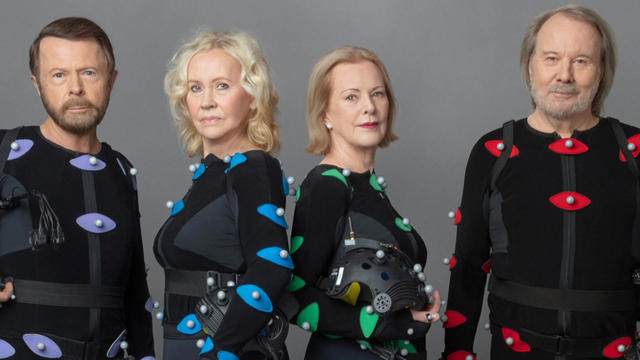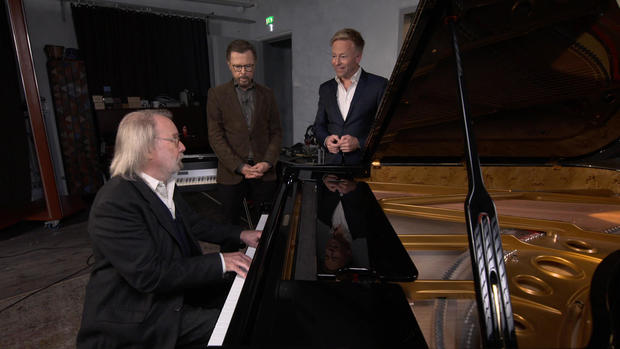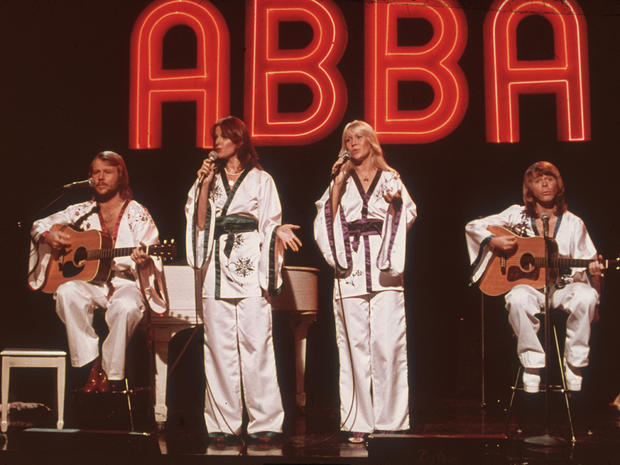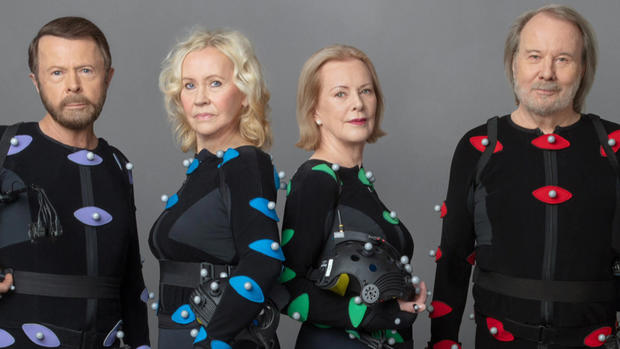▶ Watch Video: The return of ABBA
Benny Andersson and Björn Ulvaeus say they never thought they’d be back producing and releasing a new album. “It’s strange to talk ABBA in present tense,” said Ulvaeus.
And that’s coming from two of the founding members of ABBA. Their faces may not be immediately recognizable four decades on, but their music certainly is. The Swedish band sold nearly 400 million records, containing some of the biggest hits ever, like “Dancing Queen”:
Andersson composes the melodies; Ulvaeus writes the lyrics. Again, note the present tense, because ABBA has a new album, “Voyage,” coming out this week.
Correspondent Seth Doane asked, “What are the ingredients for a good pop song?”
“I think a pop song should have something that you don’t expect it to have,” Andersson replied. “You recognize it when you hear it.”
Ulvaeus added, “Simple, yet very innocent.”
“Voyage” is ABBA’s first record since the group took a “break” in 1982. “The years after, it was very quiet,” Ulvaeus said. “I thought that was the end of it. I honestly did.”
But these pop stars who defined the ’70s (and who are now in their seventies) reassembled to record in a Stockholm studio, where Andersson and Ulvaeus met with “CBS Sunday Morning.”
“Bringing the ladies in, we didn’t really know what to expect,” said Andersson. “Because I mean, they’re not 30 anymore, they’re 70-plus. They came in and they started to sing, it was like bang! Spot on.”
One of the new songs sounds like it was plucked from the archives, but it’s about today – “I Still Have Faith in You”:
Do I have it in me?
I believe it is in there
For I know I hear a bittersweet song
In the memories we share
Doane asked, “You write, ‘Memories we share’ … ‘We need one another’ … ‘I believe it’s still in there.’ Is this a sort of theme song for getting back together?”
“Yes, it is,” said Ulvaeus. “It’s about us. it’s about where we are at this point in life.”
It was not just music that originally drew these four together. “It all started with us being two couples who are going on vacations and singing together, but not having the idea to form a group!” said Ulvaeus.
They took the first letters of their first names – Agnetha Fältskog, Benny Andersson, Björn Ulvaeus, and Anni-Frid Lyngstad – and called themselves by that now-famous acronym. But Sweden was not exactly a music industry springboard.
Ulvaeus said, “It’s hard to understand for someone from America or England that to come out of Sweden at that time was absolutely impossible.”
Andersson added, “You know, it’s, ‘Guys from Sweden?'”
But then those “guys from Sweden” entered the 1974 Eurovision Song Contest hoping to break through with this: “Waterloo.”
“Waterloo,” and the hits that followed, put the Swedish band on the global stage. CBS News interviewed them just ahead of their U.S. tour in 1979.
Reporter Doug Tunnell asked, “What do you expect when you are on stage playing to an American audience for the first time?”
“Have no idea,” said Lyngstad.
“I think it will be a bit different,” said Fältskog.
Ulvaeus said, “It’s a bit scary … If we can create that atmosphere and get it across, then it’s going to be good, I think.”
Fans loved it. Critics? Less so. Rolling Stone once dismissed them as “Muzak” with “vapid lyrics.”
Ulvaeus told Doane, “I mean, they were harsh, those critics.”
“And we had the wrong clothes,” Andersson added.
“And the wrong image overall.”
“But I have to say, I didn’t care much. I don’t think any of us did, because we had this huge audience that liked our records.”
The two couples had married, but both divorced while the band was still together.
Doane asked, “How difficult was that?”
“Not professionally,” said Andersson. “Not in the studio, not when we were working.”
“This is the global broadcast exclusive, sitting down with you – but you were the two Bs in ABBA. Do you wish that the two As were also here?”
Andersson said, “That would have been wonderful, yes. But it was in the deal.”
“‘We’ll perform, we don’t want to do the press’?”
“It’s easier to say ‘no’ to things when you’re 74, 75,” Andersson said.
They did say “yes” to a tour, but one with a twist. This idea is to recreate ABBA in the form of digital avatars that’ll perform with a live band in a specially-built arena in London.
“There is something irresistible in this,” Ulvaeus said, “being able to replicate yourself, you know, in zeros and ones, on huge screens with 3,000 people in the audience. It’s going to be something spectacular.”
During a five-week recording session with 160 cameras, the four members of ABBA had to wear special suits with digital devices to capture every movement. Their performances today will be edited with their faces of yesterday.
Andersson said, “It hasn’t been done before. That’s the intriguing part of this. That’s what is tempting.”
“There’s a lot on the line,” Doane said. “A lot of money, reputation.”
“But it’s only money,” said Andersson.
And the avatars are certainly a lot more high-tech than the wax versions at Ulvaeus’ ABBA Museum, which showcases the band’s colorful history, including their attire. Ulvaeus noted, “The costume folks came with ideas, and then I would adjust them to my taste.”
“You’d say, ‘A few more feathers or more here’?” asked Doane.
“Yes, things like that!”
Away from the glitz, Ulvaeus often writes on his private island outside of Stockholm. “Quite a nice place to write a song,” said Doane.
“It is indeed. I find it so soothing and inspiring.”
His process begins with the music Andersson has composed. “Take a song like ‘Take a Chance on Me.’ I was out running and I had the sounds of the words, not the words themselves – chukk-a-CHUKK-chukk-a-CHUKK.”
“I guess that was a worthwhile run on that day,” said Doane.
“It was, it was!”
Doane asked Andersson, “How does music come to you?”
“Play rubbish for hours and hours, and all of a sudden I can hear myself playing something I haven’t heard before that I like,” he replied.
Andersson demonstrated by tickling the ivories. “That’s not a song?” Doane asked.
“It’s not, it’s just something I played now.”
“That you just made up right now?”
“I don’t know if I ‘make it up,’ I just play it!”
“So many of your songs you recognize in the first few bars.”
“Yeah, that’s good!”
“Mamma Mia,” a massive success in film and on stage, introduced ABBA to a new generation.
Ulvaeus said, “It was an experiment, you know, to let the lyrics and the spoken dialogue become one and tell the story. Nobody had done that before.”
“It’s an experiment that certainly worked well financially,” Doane said.
“And artistically, I’d say,” Andersson replied.
Artistically, they’ve proven their staying power, and are experimenting once again.
Andersson mused, “There’s been more ABBA in the world the last 20 years than the first 20 years. it’s kind of weird! And I’m happy, and grateful.”
For more info:
- “Voyage” by ABBA, available November 5 (Pre-order special editions)
- abbasite.com
- ABBA The Museum, Stockholm
- ABBA Voyage at the ABBA Arena, London (beginning May 2022)
Story produced by Mikaela Bufano. Editor: Remington Korper.





































